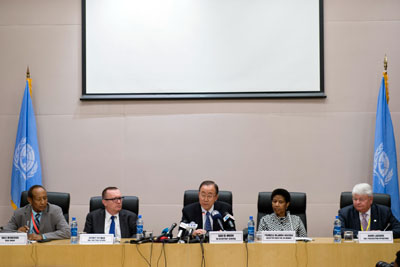African Union Summit ends with strong call for women’s empowerment
Date:
Gender was in the spotlight at the 24th Session of the African Union Heads of States’ Summit held in Addis Ababa, Ethiopia from 30-31 January, which focused on the “Year of Women's Empowerment and Development towards Africa’s Agenda 2063”.
Participating Heads of States adopted the African Union’s Agenda 2063 (a new roadmap for Africa’s long-term development that includes the need to place gender equality and equity at the centre of the continent’s social and economic development), as well as the “Addis Ababa Declaration on accelerating the implementation of the Beijing Platform for Action towards a transformational change for women and girls in Africa” (the outcome document of the Beijing+20 regional review in November 2014) and a Communiqué on gender equality (drafted during a pre-summit stakeholders consultation).*

“There can be no sustainable progress without progress for girls and women”, said UN Women Executive Director Phumzile Mlambo-Ngcuka, who took part in the UN Secretary-General’s delegation to the Summit. “They are the change agents of our future. We are still struggling to remove the structural foundations of inequality. Until new foundations are laid, we will not be able to count on gains being irreversible.”
“Women must be at the centre and front of all our lives,” said UN Secretary-General Ban Ki-moon in his opening speech. “I applaud your proposal at this summit: Women’s Empowerment and Development towards Africa’s Agenda 2063. Africa is home to Parliaments and Cabinets with the world’s highest percentage of women members.”
However, he called for even quicker action, urging African States to make a deep and lasting difference to the lives of women and girls by 2020: “We have much more work to do to unleash [their] tremendous potential. They need better access to secondary education, decent work and economic opportunities. They need more help to combat maternal mortality and poverty, and genital mutilation. They need more protection from the scourge of violence at the hands of men and boys.”
As a member of the Secretary-General’s delegation to the AU Summit, UN Women’s Executive Director took part in the official press briefing as well as meetings with Head of States and delegations, where she advocated for stronger leadership to support women’s empowerment and support for a stand-alone gender goal within the new UN development framework being hashed out this year. She also reiterated during her interactions that tackling early child marriages and barriers to girls’ education was central to addressing the root causes of poverty in Africa.
During pre-summit stakeholder consultations from 22-23 January, participants adopted a Communiqué identifying critical issues for action, such as the need to: acknowledge risks which endanger progress especially for women such as Ebola and terrorism; change mindsets and see culture as a driving force for change rather than as a constraint to women’s rights and women’s empowerment; establish monitoring systems with gender-sensitive indicators; enhance efforts by Member States to implement commitments of the Maputo Protocol related to women’s reproductive health and rights; ensure women’s participation at all stages of value chains; and establish a Special Fund for Women in collaboration with the African Development Bank and the private sector.
Following-up on the recommendation to dedicate more resources to women’s organizations and issues, including financing for women’s rights frameworks, Ms. Mlambo-Ngcuka participated on 31 January in a high-level discussion on the development of a Special Fund for Women, alongside a number of Foreign Ministers, Ministers of Gender and High Officials from the African Union and the African Development Bank.
The Executive Director also met with a delegation of young women who participated in the AU Summit and participated in a high‐level breakfast meeting on 30 January to bring attention to the issues of early and child marriage where stakeholders showed collective commitment.
*All adopted decisions, declarations and resolutions will be available on the African Union website shortly.